In today’s fast-paced society, eating has often been reduced to a mindless refueling process. But have you ever considered how you eat could be just as important as what you eat? Welcome to the world of mindful eating, a practice emphasizing the importance of focusing on the present moment and savoring each bite. With obesity and related health issues on the rise, understanding and applying mindful eating could be the key to effective and sustainable weight management. This article delves into what mindful eating is, why it matters, and how you can incorporate it into your life.
The Problem with Mindless Eating

Our modern lifestyle often pushes us to eat on the run, in front of screens, or while juggling multiple tasks. This lack of attention to the act of eating is referred to as mindless eating, which can lead to overconsumption and unhealthy food choices. When we eat mindlessly, we’re not only likely to eat more than our body needs, but we also tend to miss out on the joy and satisfaction that mindful eating can bring.
Not only can mindless eating lead to weight gain, but it also affects our overall health. Consuming food too quickly can cause digestive issues, such as bloating and indigestion. Moreover, when we eat mindlessly, we often overlook the signals our body sends us, such as the feeling of fullness. This disconnection can lead to overeating and, in the long term, to problems like obesity and its related health risks.
Understanding Mindful Eating

Mindful eating is the practice of paying full attention to the experience of eating and drinking, both inside and outside the body. It involves noticing the colors, smells, flavors, and textures of your food; chewing slowly; getting rid of distractions; and learning to cope with guilt and anxiety about food. It’s about being present in the moment and savoring each bite rather than eating mindlessly.
By practicing mindful eating, we can relearn how to eat based on physiological cues like hunger and fullness rather than emotional triggers and ingrained eating habits. Mindful eating isn’t about being perfect, eating the ‘right’ things, or never allowing yourself to eat on the run again. It’s about increasing your awareness and making conscious choices about what, when, and how much to eat.
The Science Behind Mindful Eating
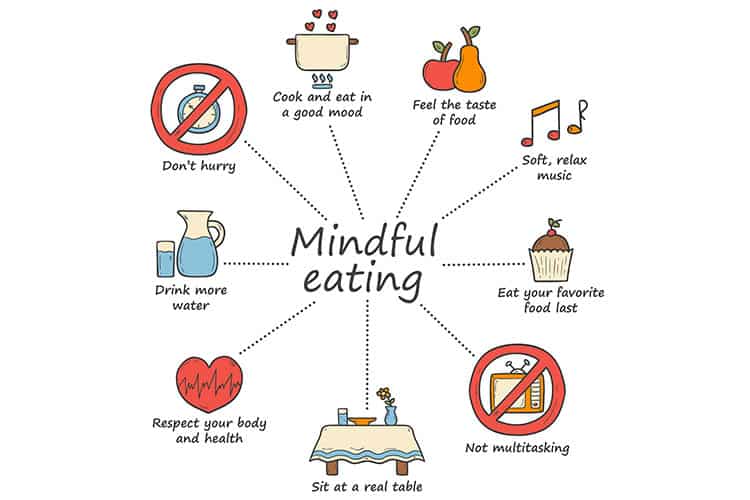
Several studies have highlighted the potential benefits of mindful eating for weight management. According to research, mindfulness during meal times can help reduce overeating, curb binge eating, and even help manage weight-related conditions like diabetes and heart disease. This is likely because mindful eating helps individuals reconnect with their internal hunger and fullness cues, promoting healthier and more balanced eating habits.
Additionally, research has shown that mindful eating can lead to a decrease in eating in response to emotions or external cues, which are key contributors to weight gain. This shift from mindless to mindful eating may significantly influence our eating behaviors, thereby supporting weight management and overall health.
Benefits of Mindful Eating
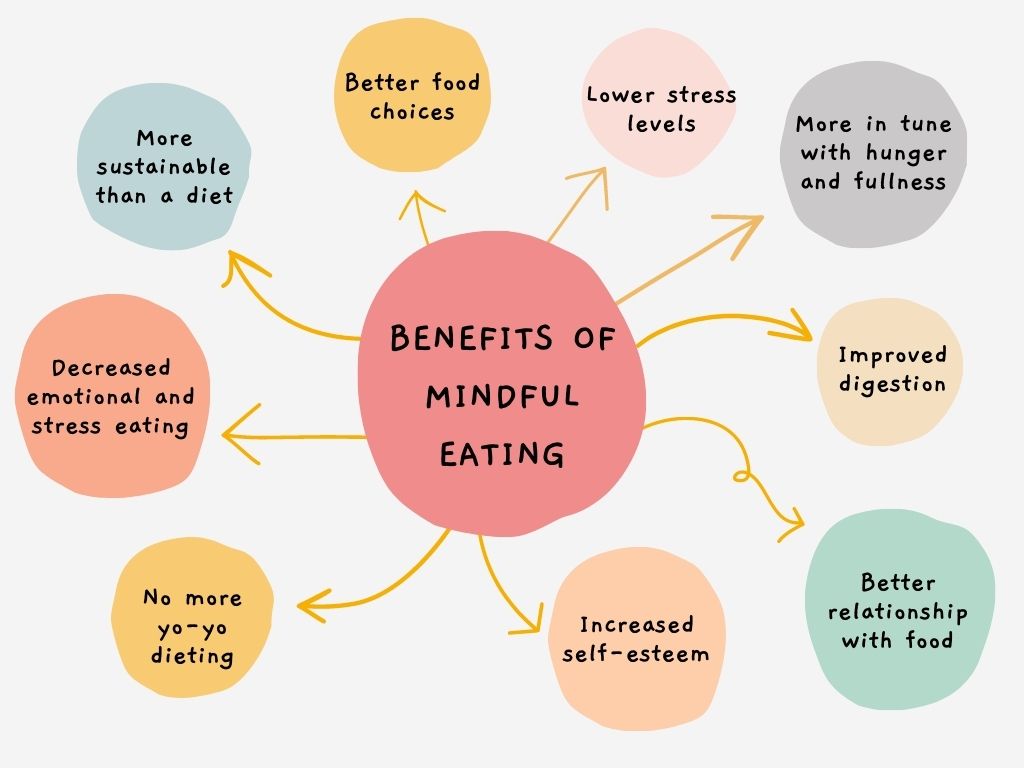
Practicing mindful eating brings numerous benefits, both physical and psychological. Physically, it aids in better digestion by encouraging slower eating and more thorough chewing, which are crucial for optimal digestion and nutrient absorption. Mindful eating also supports weight management by helping reduce overeating and promoting a healthier relationship with food. Additionally, teaching us to savor and appreciate our food can make meals more satisfying, potentially reducing cravings and the need for excessive portion sizes.
On the psychological front, mindful eating can enhance the overall enjoyment of food. It can help transform eating from a mindless, stress-filled activity into a more pleasurable and relaxing experience. It also helps reduce stress and guilt associated with eating, as it encourages acceptance and appreciation of our food choices rather than judgment and regret. This improved relationship with food can contribute to better overall mental well-being.
Practical Ways to Practice Mindful Eating
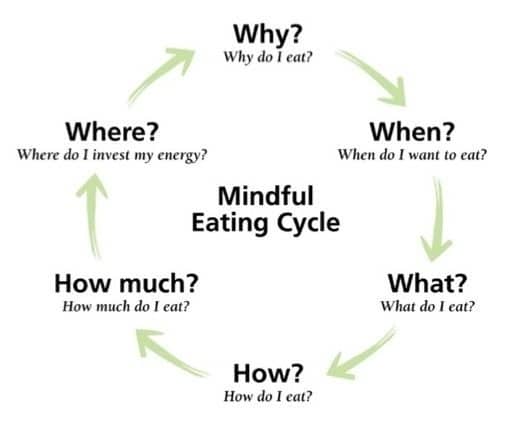
So how can one start practicing mindful eating? Firstly, slow down your meal times. It takes about 20 minutes for our brains to register that we’re full, so taking the time to eat slowly can help prevent overeating. Try setting your utensils down between bites or chewing each mouthful thoroughly. Make it a point to taste every flavor in your food and enjoy the texture of each bite.
Secondly, pay attention to hunger and fullness cues. Before eating, ask yourself: “Am I truly hungry, or am I bored, stressed, or eating out of habit?” Learn to distinguish between physical hunger and emotional hunger. During meals, stop eating when you feel comfortably satisfied, even if there’s still food left on your plate. By tuning into these cues, you can ensure you’re eating for the right reasons and in the right amounts.
Mindful Eating Techniques for Weight Management
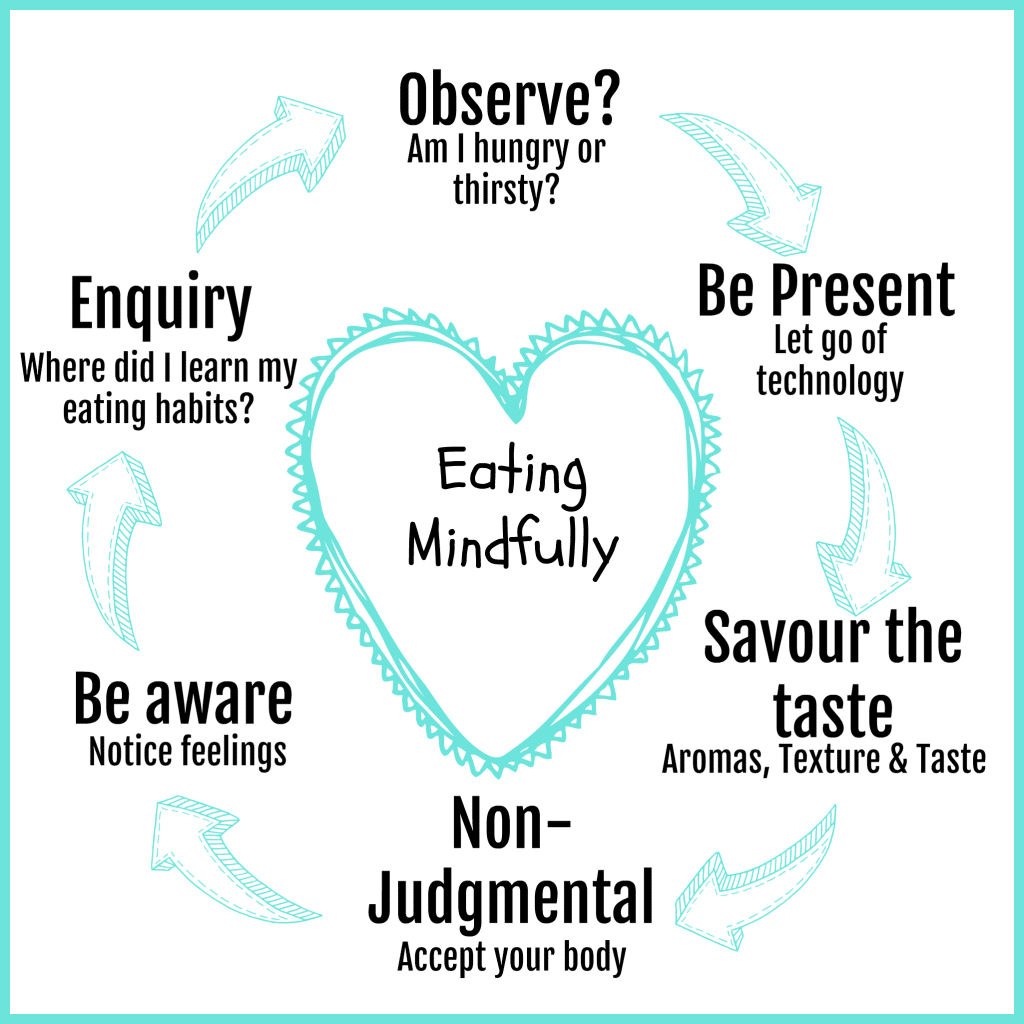
One practical technique for mindful eating is the “Savoring” technique. This involves consciously slowing down to enjoy each mouthful, noting the food’s taste, texture, and smell and the sensations of eating. It can help you appreciate your food more and feel satisfied with smaller portions. Another technique is the “Plate” technique, which involves dividing your plate into sections for different food groups to ensure a balanced meal. This can help you eat a variety of foods and get the nutrients your body needs.
Another technique is to establish a mindful eating environment. This means removing distractions like screens and eating at a designated place, not on the go. By creating a calm and focused environment for eating, you can be more present with your meal and your body’s signals, supporting better weight management.
Overcoming Challenges in Practicing Mindful Eating

While the concept of mindful eating sounds simple, implementing it can be challenging, especially in the beginning. One common obstacle is the fast pace of our modern lifestyle, which often pressures us to eat quickly or multitask. To overcome this, try scheduling designated meal times when you can eat without rushing or distractions. It might be difficult initially, but with practice, it will become easier.
Another common challenge is dealing with emotional eating, which can be deeply ingrained. Mindful eating encourages us to pay attention to our emotional states before, during, and after meals. If you notice you’re reaching for food out of stress or boredom rather than hunger, try to find other ways to cope with these emotions, such as taking a walk, practicing deep breathing, or talking to a friend. Over time, these mindful practices can help you develop a healthier relationship with food and manage your weight more effectively.
Mindful Eating and Exercise: A Balanced Approach

While mindful eating is a crucial component of weight management, it’s important to remember that it’s only one piece of the puzzle. Regular physical activity is equally important in maintaining a healthy weight and overall well-being. Exercise helps burn calories, build muscle, and boost metabolism, all supporting weight management. Furthermore, just as we apply mindfulness to eating, we can also apply it to exercise, paying attention to how our body feels and the joy movement can bring.
However, it’s crucial not to view exercise as a punishment or a way to ‘burn off’ unhealthy food choices. This can lead to an unhealthy relationship with both food and exercise. Instead, try to see exercise as a celebration of what your body can do and a way to stay healthy and strong. This positive mindset, combined with mindful eating, can create a balanced, sustainable approach to weight management.
Mindful Eating Vs. Dieting: A Comparative Analysis
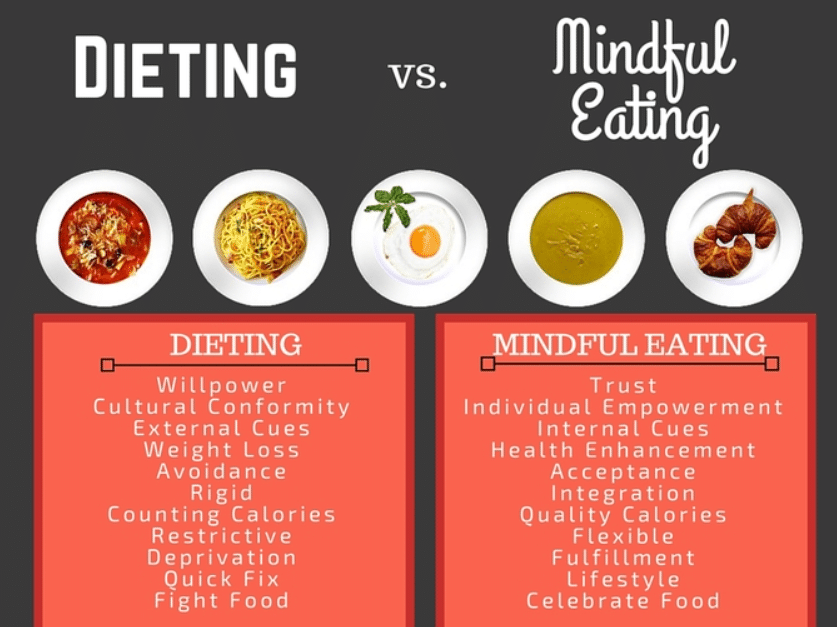
Traditional dieting often involves restricting certain foods or food groups, counting calories, and following rigid eating rules. While this might lead to short-term weight loss, it’s often unsustainable in the long term and can lead to a harmful cycle of yo-yo dieting. Furthermore, dieting can contribute to feelings of deprivation, guilt, and obsession with food, which can affect mental health.
On the other hand, mindful eating promotes a healthier and more sustainable approach to weight management. It doesn’t involve any off-limits foods or strict rules. Instead, it encourages tuning into your body’s signals and making conscious, balanced food choices. This approach supports physical health and promotes a healthier mindset and relationship with food. Therefore, mindful eating can be a beneficial alternative to traditional dieting.
Success Stories: Real-life Examples of Mindful Eating for Weight Management

There are countless success stories of individuals who’ve achieved significant weight loss and improved health through mindful eating. These individuals have learned to listen to their body’s cues, savor their food, and form a healthier relationship with eating. Their journeys show that weight management isn’t about quick fixes or deprivation but sustainable lifestyle changes and mindful choices.
For instance, one individual lost over 50 pounds by adopting mindful eating practices and letting go of restrictive dieting. They learned to slow down, enjoy their meals, identify true hunger and fullness signals, and navigate emotional eating. Their story illustrates the power of mindful eating and its potential for sustainable weight management.
The Future of Mindful Eating

The concept of mindful eating has gained traction over the years and will likely continue to do so. As more people seek sustainable and healthy ways to manage their weight, mindful eating offers a promising solution. It can potentially change not only individual eating habits but also broader societal attitudes toward food and health.
The health and wellness industry has begun incorporating mindfulness into its programs, acknowledging its benefits for weight management and overall health. Future developments may include more resources, apps, and programs focused on teaching and promoting mindful eating practices. These advancements will make mindful eating more accessible and could significantly impact global health and wellness.
Embracing the Journey: The Last Bite on Mindful Eating
Mindful eating presents a shift from conventional dieting methods towards a more conscious, holistic, and sustainable approach to weight management. By paying attention to our food and our body’s cues, we can enhance our physical health, improve our mental well-being, and find joy in the simple act of eating. Although mindful eating requires practice and patience, the journey is well worth the rewards. So why not give it a try? Start your mindful eating journey today and discover a new, balanced relationship with food and your body.


